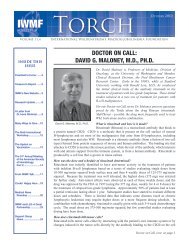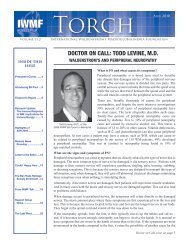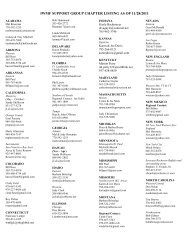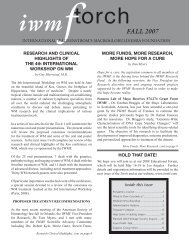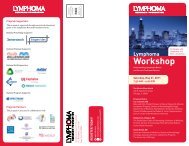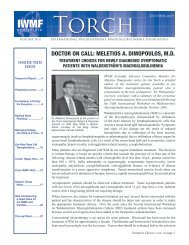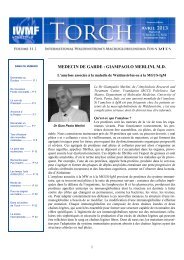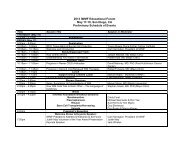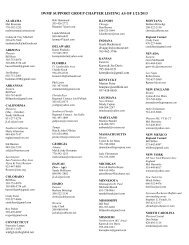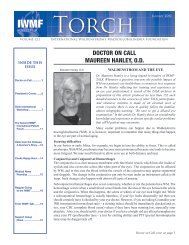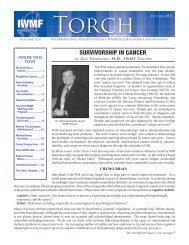Spring 2008 - International Waldenstrom's Macroglobulinemia ...
Spring 2008 - International Waldenstrom's Macroglobulinemia ...
Spring 2008 - International Waldenstrom's Macroglobulinemia ...
Create successful ePaper yourself
Turn your PDF publications into a flip-book with our unique Google optimized e-Paper software.
PAGE 12<br />
CAREGIVING IN WALDENSTROM’S<br />
MACROBGLOBULINEMIA<br />
by Connie Paul, Ph.D., ABPP<br />
It’s a beautiful winter day here in Tennessee today as I write<br />
this article on the topic of caregivers for the Torch. Ever<br />
since my husband, Bill, was diagnosed with WM in May<br />
2005, our bookcase has a space dedicated for filing the Torch<br />
issues, with their familiar, bright blue covers, together with<br />
other references on WM. We both look forward to reading<br />
the next issue of the Torch, and my husband always asks me<br />
to return it to him to be filed for later use.<br />
When I was first asked to write this article it was difficult to<br />
decide what specific aspect of caregiving to focus on. WM<br />
is a complex disease that may affect virtually every area of a<br />
person’s life including physical health, cognitive functioning,<br />
social roles, psychological well-being, sense of self, family<br />
relationships, work and social environments. Caregivers for<br />
family and friends diagnosed with WM can be called upon<br />
to provide a wide scope of services ranging from, and not<br />
limited to, emotional support, personal care, and household<br />
responsibilities. Caregiving can also affect the physical and<br />
emotional health of the caregiver. It is not uncommon for<br />
caregivers, while providing care for a loved one, to neglect<br />
their own health. Stress for caregivers comes in the form of<br />
worry for a loved one, financial strains, time commitments,<br />
decreased social outlets/contacts, work demands, and<br />
changing roles.<br />
The watch and wait time period recommended by the<br />
treatment team for some WMers adds another dimension to<br />
the caregiver role that is specific to WM. Sometimes it is<br />
hard to grasp that doing nothing, so to speak, is really doing<br />
something good and adaptive. It may seem strange to know<br />
that your loved one or friend has been diagnosed with a rare<br />
form of cancer and has been advised that the best course of<br />
action is simply to monitor the clinical course of the disease<br />
over time. What is a caregiver to do in such a situation?<br />
The first step in providing the best support and care is to<br />
know the personality and propensities of your friend or loved<br />
one. It is never a good idea to deliver supportive and caring<br />
behavior without first knowing if what is offered will be well<br />
received and result in being truly helpful in the context of<br />
the situation. There is a vast range of possible interactions<br />
between patient and caregiver. The frequency and form of<br />
the contacts may vary according to the particular situation,<br />
but whatever form contacts may take, caregiving will be<br />
most effective when the caregiver knows the patient well.<br />
Being well educated about the disease and treatment options<br />
is the next step for the caregiver. It is difficult to support and<br />
care for someone if your information and knowledge base<br />
about the disease are limited. The Torch, the annual IWMF<br />
Educational Forum, the IWMF support groups, and the<br />
IWMF talk-list serve all provide a wealth of information and<br />
resources for learning about WM. Bill and I certainly know<br />
more about hematology than we did three years ago! I have<br />
enjoyed attending the last two Ed Forums, learning more and<br />
meeting new friends along the way. When Bill talks about<br />
something he has read recently or learned on the talk-list, it<br />
is good for me, too, to be able to join in and support him in a<br />
conversation about his new knowledge of WM.<br />
A third step for caregivers is the role of “being there” during<br />
times of deliberation and decision making. An example<br />
would be when treatment options are being weighed. Never<br />
tell the person you care for what they should do and how they<br />
should do it. This leads to misunderstanding or confusion.<br />
A caregiver should allow a process of thinking out loud,<br />
weighing options, providing information, and asking<br />
questions for reflection. In this way the caregiver helps to<br />
find what is best for the individual. And then-and this is very<br />
important-once your loved one or friend determines a course<br />
of action and makes a decision, the role of a caregiver is to<br />
give support, to help with implementation of the decision,<br />
and to provide comfort. The goal becomes getting through<br />
the daily challenges together.<br />
Yet another step for a caregiver is to keep one’s own balance<br />
in the course of taking care of another. Strong coping skills,<br />
resiliency, respite, emotional support, self-care–all are as<br />
important for the caregiver as for the person diagnosed with<br />
WM. All things in nature seem to work better with balance.<br />
At the 2007 Ed Forum in Atlanta I was pleased to be invited<br />
to present a talk on the topic of caregivers. I very much<br />
enjoyed meeting some of you, and I hope those who attended<br />
last year profited from the opportunity to meet each other<br />
and share aspects of being a WM caregiver.<br />
This year I have been invited again to speak on the topic of<br />
the WM caregiver at the <strong>2008</strong> Ed Forum in Los Angeles. I<br />
look forward to seeing some of you again and meeting new<br />
attendees, too. I would appreciate your providing me with<br />
any specific topics you would like me to address during<br />
this year’s WM caregiver presentation. I would be happy to<br />
incorporate your input. You can reach me at: TPAMember@<br />
Juno.com<br />
I look forward to hearing from you!<br />
CORRECTION<br />
The statement concerning predictors of positive responses<br />
to Rituxan therapy, printed on page 7 of the Winter <strong>2008</strong><br />
Torch in the summary of Dr. D.M. Weber’s presentation<br />
at the 4th <strong>International</strong> Workshop on WM, should be<br />
amended as follows: “Predictors of positive responses to<br />
Rituxan therapy include: a monoclonal protein less than<br />
40 g/L, serum albumin greater than 35 g/L, hemoglobin<br />
greater that 10 g/dL, and a kappa light chain.”



